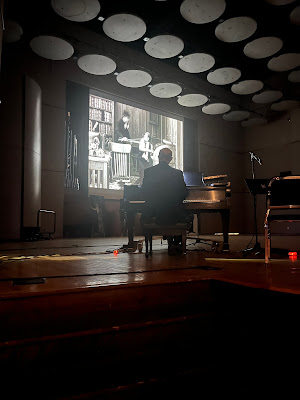Just a few notes prior to heading out to Cleveland to do music this Friday for 'The Last Command' (1928), one of the greatest silents (in my opinion) and which, surprisingly, they've never run at the Cinematheque.
I say surprisingly because the guy who's managed the Cinematheque for nearly 40 years, John Ewing, has an encyclopedic knowledgeable about cinema and often includes silent film programs in the venue's schedule.
Somehow, director Josef von Sternberg's most powerful silent, featuring a towering performance by Emil Jannings that helped him win the very first Academy Award for Best Actor, never made it to the Cinematheque's screen.
Well, that omission will be rectified on Friday, March 15—and just in time, too, as John is retiring this spring after almost four decades of service to Cleveland-area cinephiles.
It's been my pleasure to accompany Cinematheque programs over the years. And I appreciate the opportunity to head out for one last show during John's storied tenure.
Storied? Indeed—his impending retirement made headline news all over Ohio: here, and here, and here.
Happy trails, John! But not until I head out to Cleveland for one last round-up, which starts at 7 p.m. on Friday, March 15, and which includes not only 'The Last Command' but also a French film I've never heard of before: 'Menilmontant' (1926) from director Dimitri Kirsanoff.
Although it's my last screening under John's watch, it won't be my last visit to Cleveland as an accompanist. I'm already booked to do music on Saturday, Jan. 18, 2025 for 'The Lost World' (1925) at the 50th annual 36-hour sci-fi marathon at Case Western Reserve University, which is just a few blocks down Euclid Ave. from the Cinematheque.
Okay, see you in Cleveland. But before I leave, a quick glance back at recent screenings, which included a seasonally and locationally appropriate showing of 'Way Down East' (1920) on Wednesday, March 6 at the Flying Monkey Moviehouse in Plymouth, N.H.
I saw "seasonally" because the film's climax takes place in New England at this time of year. And "locationally" because the Flying Monkey is not that far from the part of the Connecticut River Valley where the many of the film's exteriors were shot, including the sequence with Lillian Gish adrift on the ice floes.
We showed the 1931 re-release version of the film, which is about 40 minutes shorter than director D.W. Griffith's original cut. People seemed to enjoy it, and cheered when Gish was rescued by Richard Barthelmess just as she was about to go over the falls.
But somehow, to me it lacked the full-length version's monumental quality. The climax seemed to come too fast. Once again, I'm reminded that Griffith really knew what he was doing.
In other news, a screening of the silent version of 'Peter Pan' (1924) in my hometown on Sunday, March 10 brought familiar faces to the Bedford (N.H.) Public Library. One woman asked me about a weekly column that I used to write for the local paper—which I stopped writing nearly 20 years ago now!
But the real highlight of the past week was my now-annual appearance at the Blazing Star Grange Hall in Danbury, N.H., where a capacity crowd enjoyed Buster Keaton and Ernest Torrence in 'Steamboat Bill, Jr.' (1928).
New Hampshire towns are full of former Grange Hall buildings that no longer house Grange chapters. But not Danbury, where the local Grange still maintains its own hall, which I think looks very much like it might have 100 years ago.
Although the programming includes a silent film program each year at about mud season, that doesn't mean new ideas aren't welcome. In that vein, last Saturday night saw the debut of a new "soup and bread supper" option to go along with movie night.
I was busy setting up, and I'd already eaten, so I didn't get downstairs until most of the soup was gone. Here's the impressive line-up:
This one seemed especially ambitious. Or maybe it was just the high tech crockpot used to serve it.
And if the soup didn't fill you up, a makeshift concessions counter upstairs was ready for movie-goers.
The paper bags contain popcorn, freshly popped. Alas, Grange members sold only a handful of bags—maybe because everyone was full of soup!
And it was a conversation after the screening that gave me confidence that this was one Grange chapter that hadn't lost touch with its agricultural base.
What would happen to the uneaten and unsold popcorn? "The pigs would love it!"














